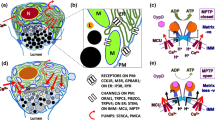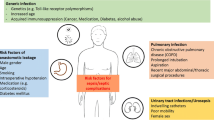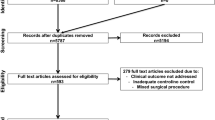Abstract
Background
Early surgical intervention in necrotizing pancreatitis (NP) is associated with high mortality. Guidelines recommend fine needle aspiration (FNA) in patients with NP and signs of sepsis. Because infection of necrosis is considered an indication for surgery, operations are often performed early. We changed treatment toward a conservative approach with FNA in selected cases only, thereby reducing the rate of necrosectomy.
Methods
Retrospectively analyzed patients, all operated on for FNA-proven infection of pancreatic necrosis (n = 20, group 1) were compared to patients subjected to conservative treatment (n = 24, group 2) who were followed prospectively.
Results
Prognostic scores did not differ between the two groups, indicating comparable severity: the Acute Physiology and Chronic Health Evaluation (APACHE II) score was 19.8 ± 1.7 versus 16 ± 2.2; the Sequential Organ Failure Assessment (SOFA) score was 8.7 ± 1.4 versus 6.9 ± 1.0, the C-reactive protein (CRP) level on day 3 was 243 ± 21 versus 291 ± 21, and the CTSI (CT severity index) was 7.8 ± 0.5 versus 7.9 ± 0.4 (p = ns). Ten patients in group 2 underwent operation because of severe extrapancreatic complications. Mortality differed significantly (45% in group 1 vs. 8.3% in group 2; p = 0.01).
Conclusions
A highly conservative approach avoiding open necrosectomy in NP results in significantly lower mortality than previous serial FNA and consecutive indication for surgery in case of proven infection. Open surgery in NP should be reserved for concomitant intra-abdominal complications.
Similar content being viewed by others
References
Hartwig W, Maksan SM, Foitzik T et al (2002) Reduction in mortality with delayed surgical therapy of severe pancreatitis. J Gastrointest Surg 6:481–487
Warshaw AL (1993) Damage prevention versus damage control in acute pancreatitis. Gastroenterology 104:1216–1219
Beger HG, Buchler M, Bittner R et al (1988) Necrosectomy and postoperative local lavage in necrotizing pancreatitis. Br J Surg 75:207–212
Bradley EL III, Allen K (1991) A prospective longitudinal study of observation versus surgical intervention in the management of necrotizing pancreatitis. Am J Surg 161:19–24
Uhl W, Warshaw A, Imrie C et al (2002) IAP Guidelines for the Surgical Management of Acute Pancreatitis. Pancreatology 2:565–573
Hungness ES, Robb BW, Seeskin C et al (2002) Early debridement for necrotizing pancreatitis: Is it worthwhile? J Am Coll Surg 194:740–744
Bradley EL III (1993) A clinically based classification system for acute pancreatitis. Summary of the International Symposium on Acute Pancreatitis, Atlanta, GA, September 11–13, 1992. Arch Surg 128:586–590
Rau BM, Bothe A, Kron M et al (2006) Role of early multisystem organ failure as major risk factor for pancreatic infections and death in severe acute pancreatitis. Clin Gastroenterol Hepatol 4:1053–1061
Isenmann R, Rau B, Beger HG (1999) Bacterial infection and extent of necrosis are determinants of organ failure in patients with acute necrotizing pancreatitis. Br J Surg 86:1020–1024
Rünzi M, Niebel W, Goebell H et al (2005) Severe acute pancreatitis: nonsurgical treatment of infected necroses. Pancreas 30:195–199
Buchler MW, Gloor B, Muller CA et al (2000) Acute necrotizing pancreatitis: treatment strategy according to the status of infection. Ann Surg 232:619–626
Werner J, Feuerbach S, Uhl W et al (2005) Management of acute pancreatitis: from surgery to interventional intensive care. Gut 54:426–436
Heinrich S, Schafer M, Rousson V et al (2006) Evidence-based treatment of acute pancreatitis: a look at established paradigms. Ann Surg 243:154–168
Fernandez-del Castillo C, Rattner DW, Makary MA et al (1998) Debridement and closed packing for the treatment of necrotizing pancreatitis. Ann Surg 228:676–684
Besselink MG, Verwer TJ, Schoenmaeckers EJ et al (2007) Timing of surgical intervention in necrotizing pancreatitis. Arch Surg 142:1194–1201
van Santvoort HC, Besselink MG, Bakker OJ et al (2010) A step-up approach or open necrosectomy for necrotizing pancreatitis. N Engl J Med 362:1491–1502
Garg PK, Sharma M, Madan K et al (2010) Primary conservative treatment results in mortality comparable to surgery in patients with infected pancreatic necrosis. Clin Gastroenterol Hepatol 8:1089–1094
Rau B, Bothe A, Beger HG (2005) Surgical treatment of necrotizing pancreatitis by necrosectomy and closed lavage: changing patient characteristics and outcome in a 19-year, single-center series. Surgery 138:28–39
Pederzoli P, Bassi C, Vesentini S et al (1993) A randomized multicenter clinical trial of antibiotic prophylaxis of septic complications in acute necrotizing pancreatitis with imipenem. Surg Gynecol Obstet 176:480–483
Martinez J, Sanchez-Paya J, Palazon JM et al (2004) Is obesity a risk factor in acute pancreatitis? A meta-analysis. Pancreatology 4:42–48
Petrov MS, Kukosh MV, Emelyanov NV (2006) A randomized controlled trial of enteral versus parenteral feeding in patients with predicted severe acute pancreatitis shows a significant reduction in mortality and in infected pancreatic complications with total enteral nutrition. Dig Surg 23:336–344
Marik PE, Zaloga GP (2004) Meta-analysis of parenteral nutrition versus enteral nutrition in patients with acute pancreatitis. BMJ 328(7453):1407
Author information
Authors and Affiliations
Corresponding author
Rights and permissions
About this article
Cite this article
Alsfasser, G., Schwandner, F., Pertschy, A. et al. Treatment of Necrotizing Pancreatitis: Redefining the Role of Surgery. World J Surg 36, 1142–1147 (2012). https://doi.org/10.1007/s00268-012-1504-5
Published:
Issue Date:
DOI: https://doi.org/10.1007/s00268-012-1504-5




